Is there a way to beat all the pages on the first page of Google and rank above them? Yes, you can do so by optimising your page for featured snippets.
In this article, we discuss featured snippets and their importance. Different types of snippets and how to optimize your article for these snippets.
What is a Featured Snippet?
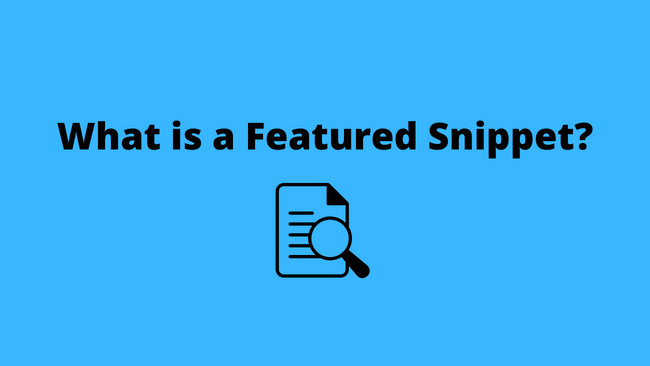
Featured Snippets is a short informational text that appears on the top of the Google Search engine result pages (SERP). It shows up above the #1 result (position zero). It’s a short and direct answer to the searcher’s query. Another name for this feature is the answer box.
Google search pulls the text from any web page ranking on the first page. If you are not ranking on the first page, your post will not have a chance of appearing as the featured snippets.
Featured snippets consist of
- An Image
- Page Title
- URL of the page
Here is an example of a featured snippet.
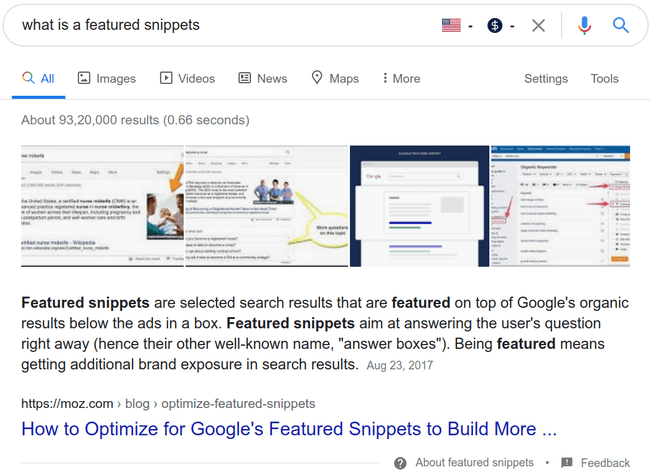
You should not confuse it with rich snippets. To remove the confusion between these two types of snippets. Let’s briefly discuss the differences between them.
Featured Snippets vs Rich Snippets
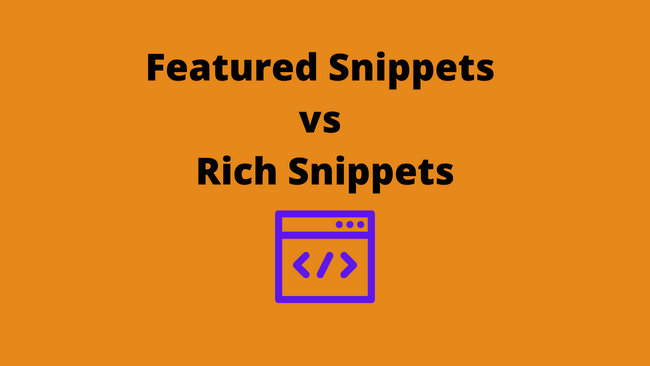
The rich snippets are an enhanced form of regular search engine results. Whereas the featured snippets are answers pulled directly from the web pages.
The featured snippets always appear at the top of the search results i.e. position #0. In contrast, the rich snippets appear within the search results but they stand out due to the enhancements added to them.
The rich snippets pull different types of structured data like price and review, ratings etc.

Why Are Featured Snippets Important?
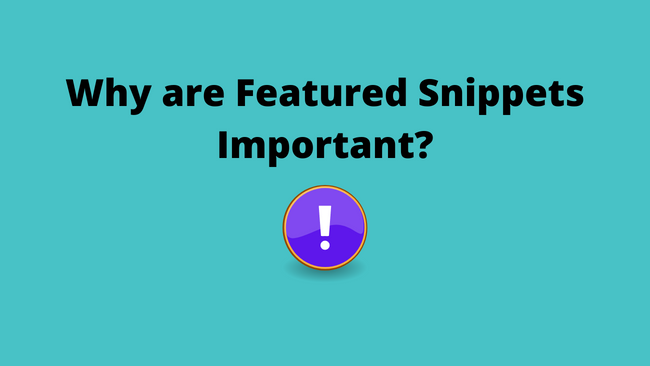
Featured snippets are important as they appear at the top of Google’s organic search results. You get free traffic even when your site appears at the bottom of the first page.
In a nutshell, the snippets help you beat the competition. enhances your authority and boosts traffic to your site.
Ahrefs.com’s study reported that a featured snippet increases the click-through rate of a page by ~8.6%. You’ll agree that these search engine features are a shortcut to the top of the Google search result page. It takes a lot of effort to rank on the first page. And it’s tough to rank at position #1. The featured snippets help you jump through the results and rank at position #0.
What Are Different Types Of Featured Snippets?
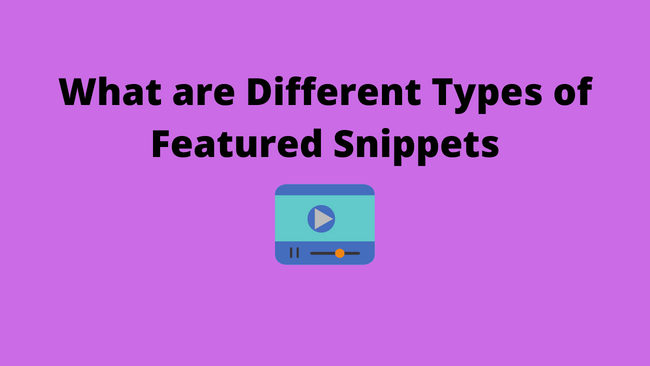
There are 3 different types of featured snippets.
1. The Paragraph snippet or Definition Box.
2. The List Snippet
- The Ordered List.
- The Unordered List.
3. Table Snippet.
Now, let’s learn about the different types of snippets. We start with a paragraph snippet.
The Paragraph Snippet
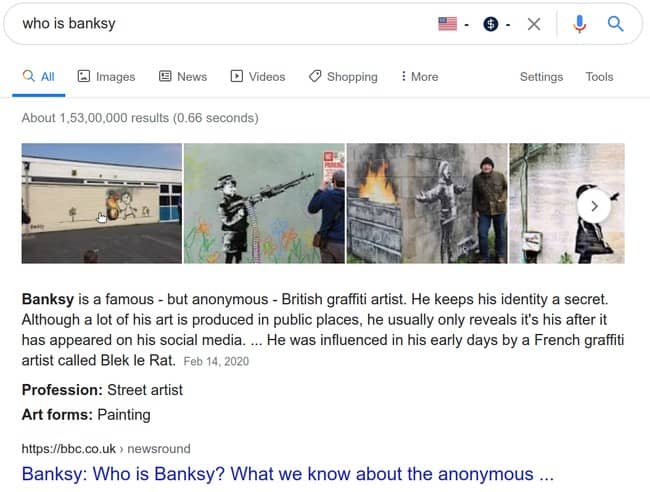
A paragraph snippet is a direct answer to a search query in paragraph format. They are the most common form of SERP features accounting for 50% of all the snippets. They can have a minimum of 50 words or 300 characters.
The List Snippet
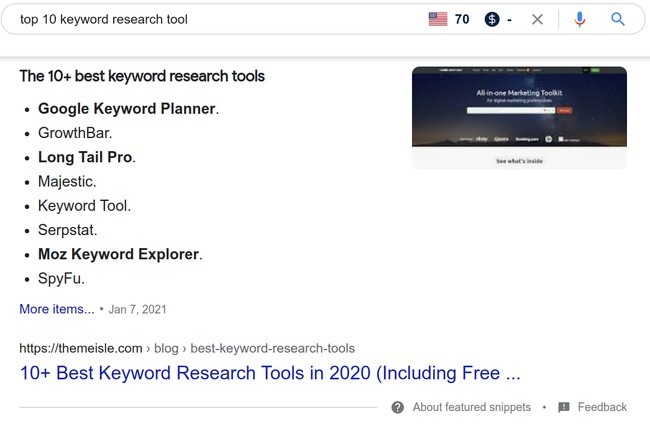
The List Snippet shows up in response to a query that requires an answer in many steps.
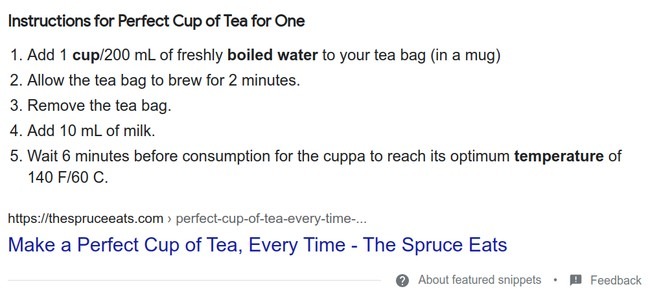
Based upon the query the list snippet can be:
- Ordered List Snippets
- Unordered List Snippets
These are the most common type of snippets after paragraph snippets (approx 37% of total results).
Table Snippets
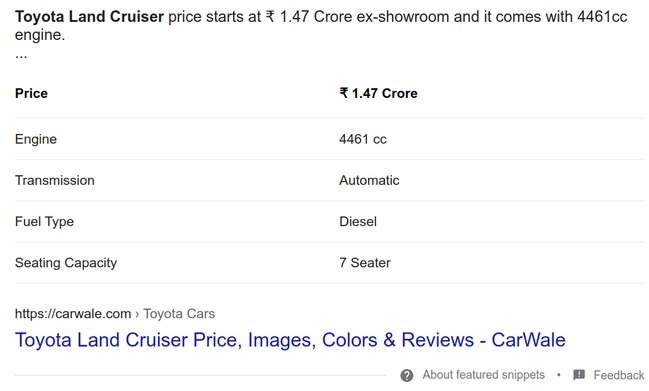
The Table snippets show up when the query response is tabulated data. These are the least common type of snippets.
How to Find Keywords that Trigger Featured Snippets?
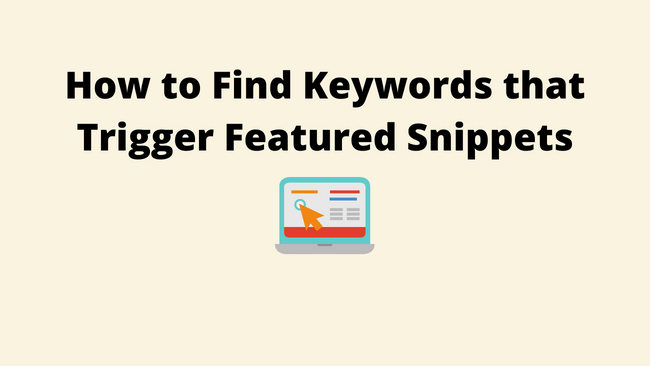
Most of the studies confirm that featured snippets are triggered by long-tail keywords. An increase in the number of words in your search query increases the chance of triggering a featured snippet.
Next, you should have properly structured content. Google loves structured content. So use subheadings, lists and tables while creating the content.
Here are the steps to optimise your content for featured snippets.
Keyword Research
You must start with our good old keyword research. Choose the keywords that are already ranking on the first page of Google. As per the research done by Ahrefs, 99.58% of the featured snippets are selected from the top 10 Google results.
If you are writing a new article you should select the keywords that can help you rank on the first page. Your next step should be optimising the featured snippets.
Start looking for keywords that ask a question. The long-tail keywords that contain questions normally start with words like what, when, why, where or how. You should also include the keywords which have a short definition, summary or that result in a short answer. This answer can be in the form of a short paragraph, list or a table
You can uncover more question-and-answer types of content using these tools:-
- Google’s People Also Ask
- Answer The Public
- Q&A sites
- Social Media
- Know your Audience
Google’s People Also Ask

Google’s people also ask sections to help you find out the questions or topics related to your search query. You can expand the question to check out the answers. As you expand the question more related ones will be added to the bottom of this section.
Answer The Public
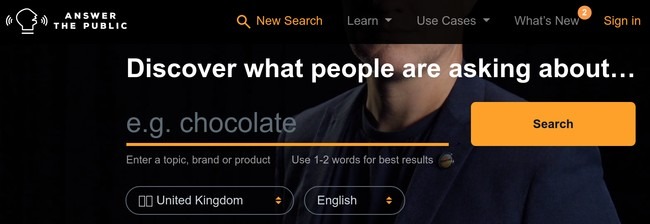
Answer the public helps you in uncovering the questions that people ask about a specific topic. It gives you a lot of questions that are related to your keyword or topic
After you have done your keyword research. Plug your keywords into this tool and pick the question that you can answer in your article.
Q&A Sites

Social Media

Social Media sites like Twitter or Facebook are a gold mine of questions. Monitor the questions that are being regularly asked on these social media sites. This will provide you with a long list of questions.
Once you find out all the keywords to optimise for snippets, then the next step is to optimise them for generating the snippets.
Know Your Audience
You should research your target segment or niche. Ask people, this will help you find out their questions, concerns and pain points. These queries can be converted into a short answer that suffices the search intent. The answer can be in the form of a short paragraph, list or table etc.
How to Optimize for Featured Snippets?
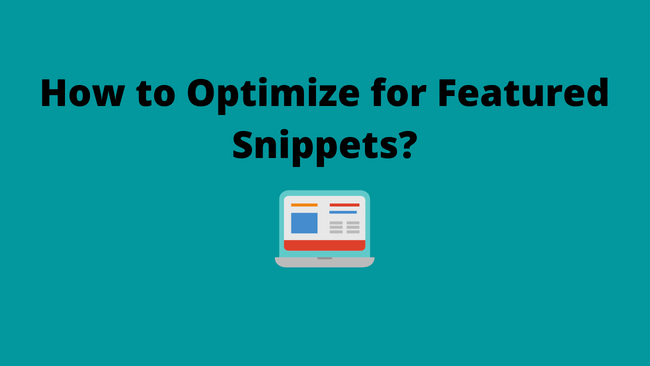
You might be asking how to get featured snippets? Hold on, now we will discuss the steps to optimise your site for the featured snippets.
Answer Similar Questions
Ensure one article covers a single topic in depth. A comprehensive article will generate a lot of similar questions. More answers mean more options for Google to generate snippets.
Add Flow to Questions
The questions should be organised into a flow. The questions should follow a logical and meaningful sequence. First answer the basic question, followed by the next question in the logical flow.
Concise Answer
The answer should be concise and to the point. The answer boxes that Google selects are small paragraphs of text. The tone of the answer should be neutral as you must have seen in the academic definitions.
Proper Structure
The answer should be organised into a proper structure like the use of subheadings, lists or tables. You should make use of the h1 to h3 heading, and related HTML elements for lists and tables
How-To Section
For some topics, it becomes difficult for us to generate any questions. In that case, you can add a how-to section or FAQ section to the end of your article. Answer these questions keeping in mind all the points that we have discussed so far.
Use Eye-grabbing and Beautiful Images.
A picture is worth a thousand words. Whenever you are targeting a question for appearing as an answer box. The picture that you add to the section should be eye-grabbing. As this picture will appear along with your question. It can act as clickbait for the user.
Conclusion
In this article, we have discussed what are featured snippets. How these snippets are different from rich snippets. We also know that there are three different types of featured snippets:-
- Paragraph Snippets – The most common type of snippets.
- List Snippets – These can further be divided into
- ordered lists
- unordered lists.
- Table Snippets – The least common type of snippets.
We have covered how to optimise for featured snippets. Then we discussed how to write the content that helps trigger featured snippets for your site.
If you have any questions, I would love to hear from you. You can get in touch or put it down in the comments.

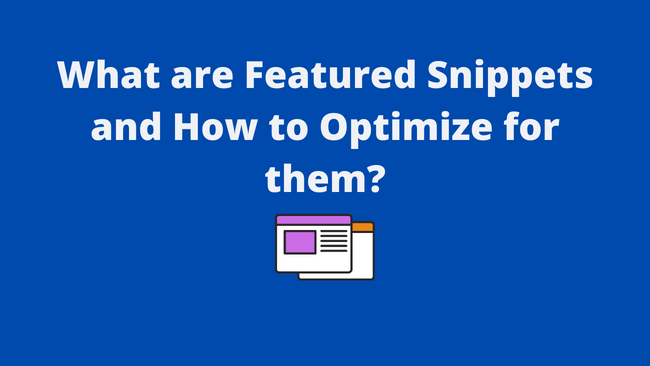
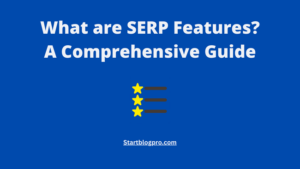
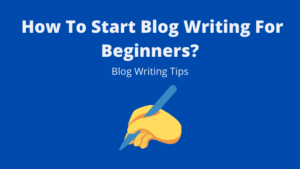

I’d like to thank you for the efforts you’ve put in writing this blog. I’m hoping to see the same high-grade content from you later on as well. In fact, your creative writing abilities has encouraged me to get my own, personal website now ;)|
Good to know that you want to start your personal website, let me know if you need any help!!!
Pingback: How To Learn SEO Free - Beginners Guide | StartBlogPro
Pingback: What are SERP features? A Beginners Guide | StartBlogPro
Your posts always make me feel like I’m not alone in my struggles and insecurities Thank you for sharing your own experiences and making me feel understood
Looking forward to your next post. Keep up the good work!
Your positivity and optimism are contagious It’s impossible to read your blog without feeling uplifted and inspired Keep up the amazing work
Thank you for creating such valuable content. Your hard work and dedication are appreciated by so many.
Your writing is so eloquent and engaging You have a gift for connecting with your readers and making us feel understood